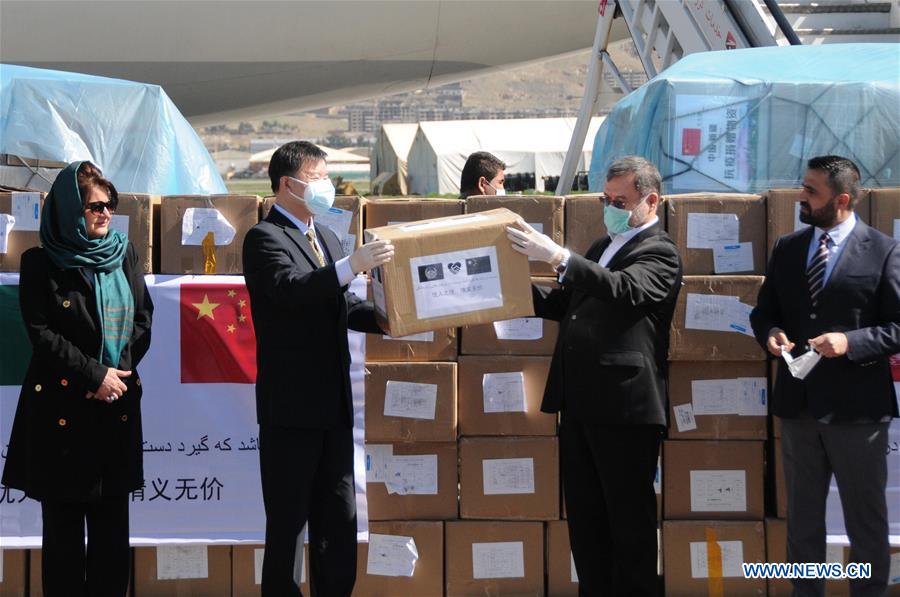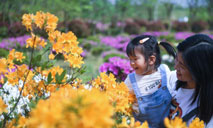China strengthens solidarity with its neighbors in fight against COVID-19

Chinese Ambassador Wang Yu (2nd L) hands over medical supplies to Mohammad Sarwar Danish, second vice president of Afghanistan, during a handover ceremony in Kabul, Afghansitan, April 2, 2020. [Photo/Xinhua]
BEIJING, April 28 (Xinhua) -- Foreign ministers from China, Afghanistan, Pakistan, Nepal, Sri Lanka and Bangladesh held a meeting on coping with COVID-19 on Tuesday via video link.
During the meeting, Chinese State Councilor and Foreign Minister Wang Yi brought forward several proposals on such issues as consolidating consensus on cooperating in the fight against COVID-19, promoting vaccine cooperation, and boosting post-pandemic economic recovery, which were supported by the other foreign ministers. A joint statement on cooperation in fighting the epidemic was also issued after the meeting.
The international community has spoken highly of the proposals, and lauded China for its contributions to the global and regional battle against the pandemic.
NEIGHBORS IN NEED
The resurgence of COVID-19 infections in Nepal started from early April.
The country's health ministry said Sunday that the total tally crossed the 300,000-mark with 3,122 new cases recorded in the last 24 hours. It also reported 28 new deaths from the disease on Sunday, a record high in nearly five months.
Hemanta Chandra Ojha, an official at the health ministry, told Xinhua that due to the high number of hospitalized patients, hospital beds, particularly those in the 15 worst affected districts, are mostly occupied.
In Sri Lanka, the number of the infected reached 102,376 on Tuesday after 997 new cases were reported a day earlier, according to official data.
With the patient count rising in recent days, there was reportedly a shortage of intensive care unit (ICU) beds for the COVID-19 patients in islandwide hospitals.
Sri Lanka has made it mandatory to wear face masks and maintain social distance, and health experts urged the public to stay home.
Besides, the total confirmed cases in Bangladesh have reached 748,628, with 11,150 deaths, while Pakistan has reported 804,939 cases so far with 17,329 deaths and 5,075 critical cases.
ASSISTANCE IN TIME
On Sunday, China handed over a batch of emergency food assistance to Afghanistan.
At the ceremony in Kabul, Chinese Ambassador to Afghanistan Wang Yu said China has provided more than 13,000 tons of food aid to Afghanistan in recent years, as well as several batches of medical supplies to fight COVID-19, and will donate vaccine doses soon.
In Pakistan, as the country is facing a serious third wave of COVID-19, the third batch of COVID-19 vaccines donated by the Chinese government was handed over to the Pakistani side on Monday.
The newly-arrived vaccines will help the country build immunity among its society to save lives, Pakistan's Federal Minister for Economic Affairs Omar Ayub Khan said at the handover ceremony.
Chinese Ambassador to Pakistan Nong Rong said during the ceremony that Pakistan is not only the first country in the world that the Chinese government provided COVID-19 vaccine aid to, but also the country that has received the largest number of China-donated COVID-19 vaccines so far.
Nepal started administering the COVID-19 vaccines amid resurging cases earlier this month, with a batch of COVID-19 vaccines developed by China's Sinopharm having been delivered to Nepal in late March.
Sri Lanka's president's office has also said that plans are already on to distribute the Sinopharm COVID-19 vaccine donated by China to Sri Lanka in the next few weeks following the World Health Organization (WHO) 's approval.
"THANK YOU" IN CHORUS
At the early stage of the COVID-19 outbreak in Pakistan, the country had little expertise and few medical relief items, which made it struggle, said Saeed Chaudhry, director of the Islamabad Council for International Affairs.
"China sent medics, experts and relief goods in time, which helped Pakistan streamline and systemize its fight against the pandemic backed by a comprehensive policy," he said.
Muzaherul Huq, a former advisor at the WHO, told Xinhua on Tuesday after the foreign ministers' meeting that Bangladesh is "hopeful" of China's proposals to control the COVID-19 pandemic and stabilize the economy.
Afghan expert and political analyst Shamsul Haq Arianfar welcomed China's decision to offer vaccines to his country, saying he and all Afghans would be grateful to China's contributions.
Ajith Dharmawardena, vice president of the Sri Lanka-China Buddhist Friendship Association, told Xinhua that the Chinese government, enterprises and people have provided a large number of medical materials to Sri Lanka to fight the pandemic, and people from all walks of life in Sri Lanka have also supported China in various ways.
In the past, whenever Sri Lanka encountered difficulties, the Chinese government and many ordinary Chinese have expressed their support to Sri Lanka in various ways, he said, adding the cooperation and mutual support during the COVID-19 pandemic have once again fully demonstrated that Sri Lanka and China are long-tested good friends that have shared weal and woe.
Hiranya Lal Shrestha, Nepal's former ambassador to Russia, told Xinhua that during this pandemic, Nepal has benefited from China's contributions in the following two aspects.
"First, it can learn from China's exemplary strategy to contain the infections, and second, it can seek the support of the vaccines and other equipment as China is exporting them to the rest of the world," he said.
Photos
Related Stories
Copyright © 2021 People's Daily Online. All Rights Reserved.










